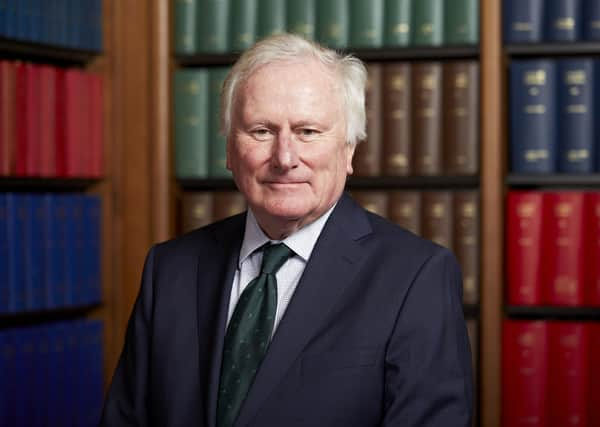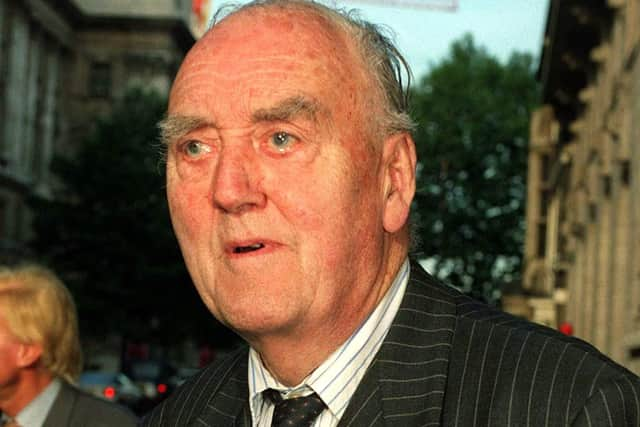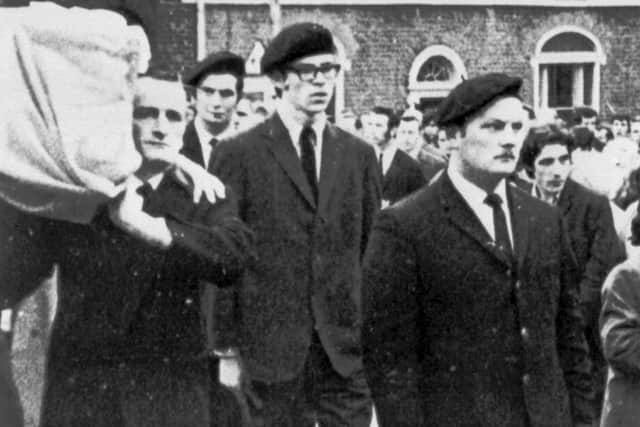Jeffrey Dudgeon: Supreme Court ruling on Gerry Adams ruling didn’t reflect violent context of the times, when civil war was imminent


I have also had experience of Lord Kerr when, as Mr Brian Kerr QC, he was acting for the NIO in its attempt to prevent decriminalisation of homosexuality during my case at the European Court of Human Rights.
He can get it wrong.
Article 4 of the 1972 Detention of Terrorists (Northern Ireland) Order, being interpreted in the Gerry Adams case at the Supreme Court, reads:


Advertisement
Hide AdAdvertisement
Hide Ad(1) Where it appears to the Secretary of State that a person is suspected of having been concerned in the commission or attempted commission of any act of terrorism or in the direction, organisation or training of persons for the purpose of terrorism, the Secretary of State may make an interim custody order for the temporary detention of that person.
(2) An interim custody order of the Secretary of State shall be signed by the Secretary of State or a Minister of State or Under-Secretary of State.
In July 1973, William Whitelaw was Secretary of State for Northern Ireland (SOSNI).
The order in question was however signed by a minister of state. Ironically the case of Gerry Adams was one where it would have appeared to Whitelaw, without needing advice, that an order was appropriate.


Advertisement
Hide AdAdvertisement
Hide AdHe knew, rather than suspected, that Adams was a key republican strategist when foolishly negotiating with the IRA at Cheyne Walk in Chelsea a year earlier.
The lower Court of Appeal in Belfast led by the Lord Chief Justice accepted that SOSNI could delegate the making of the order to another Minister under a precedent known as the Carltona principle.
Lord Kerr said that was wrong, particularly so, firstly, as in a grave case such as deprivation of liberty, the decision could not be passed down, and because 4(2) spoke of the order being one ‘of’ the SOSNI.
For something to ‘appear to’ the SOSNI was taken by Lord Kerr and others to mean ‘personally consider’.


Advertisement
Hide AdAdvertisement
Hide AdIt is hard to discern which interpretation of Article 4 is right in relation to Carltona and delegation. Both have merits.
However I would argue that the concept of matters ‘appearing’ to the SOSNI in 4(1) is so vague as to permit the arrangements at the time to be varied and not to require ‘personal consideration’. And the times were extreme. Thousands were interned. Civil war was imminent.
Whatever the circumstances, the paperwork for an order was not ‘made’ by SOSNI but by a civil servant. It might not have existed when SOSNI, perhaps listening to advice, was telephoned from Belfast while he was in London, and asked to give the go-ahead for an order.
What is certain is that whoever signed the order had a brief in front of them giving the reasons for custody. The signing was not a robotic process that could have been done by the office cleaner but by someone who had to consider the papers and who could decline to sign, if dissatisfied.
Advertisement
Hide AdAdvertisement
Hide AdUrgency was often critical and SOSNI did not stay in Belfast much of the week.
The order was temporary, being only step one of a process. The person taken into custody had to be released within 28 days unless the Chief Constable referred the matter to a commissioner, who had the power to make a detention order if satisfied that the person was involved in terrorism.
Assuming those processes were properly done, the principle of the presumption of regularity should apply to counter the expected compensation claims, even if the paperwork is now missing, as many hope. Absence of evidence is not the same as evidence of absence.
Oddly, the name of the minister of state who signed the order is not given in either judgement.
Advertisement
Hide AdAdvertisement
Hide AdThere were two at the time, William van Straubenzee who has died and David Howell. Lord Howell of Guildford, as he now is, if it was he, could attest to these events and should have been consulted.
At some point, such tasks were passed to a specific minister of state described as the security minister or duty minister.
Secondly, Lord Kerr said SOSNI should have been able to sign all such custody orders as “there was no evidence that this would place an impossible burden” on him or be “unduly onerous” given that his Labour successor from March 1974, Merlyn Rees, managed to.
This semi-political assertion lacks context for the terrible violence of the years 1972 and 1973, let alone the physical arrangements or logistics of ministers.
Advertisement
Hide AdAdvertisement
Hide AdFurthermore it takes no account of the differing political circumstances involving Rees who was desperate to end internment and presumably sought to minimise the number of orders being placed in front of him.
We ought to be told how many such orders he made. Indeed Rees ended internment in December 1975.
Lord Kerr also refers to an argument that the home secretary used always to personally decide on any reprieve in the case of condemned prisoners.
That was plainly more serious although not so onerous given executions numbered perhaps ten a year up to abolition in the 1960s.
Advertisement
Hide AdAdvertisement
Hide AdWe really need to see all the papers of the time to make considered assessments. Indeed given the flood of claims it is essential that government releases them. The danger is that out of court settlements involving hundreds of millions of pounds might otherwise be made.
Judges claim not to take account of arguments about the opening of the floodgates but they surely must, and do, have regard to consequences when it comes to likely costs following any judgement.
To date, the UK government has spent upwards of £2 billion in lawyers’ fees and personal compensation when investigating the past, and on personal claims. Much more expenditure is inevitable if the grounds for future suits are not narrowed — as they can be by legislation.
In the days ahead, due to a Covid-collapsing economy, it would be a very foolish government which decided to do other than repel claims and minimise legacy costs and also decline to hold further judicial inquiries, like that on the murder of Pat Finucane.
Advertisement
Hide AdAdvertisement
Hide AdIn his case, the Supreme Court (with Lord Kerr again in the lead) wisely said one was not required but it remains a choice for the NIO.
• Jeffrey Dudgeon is a former Belfast City councillor, historian, author and gay rights activist